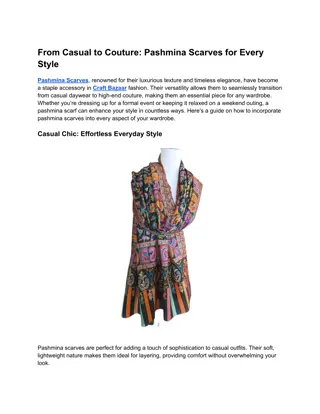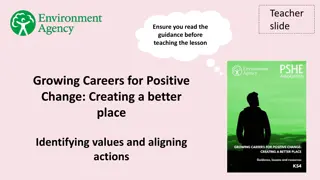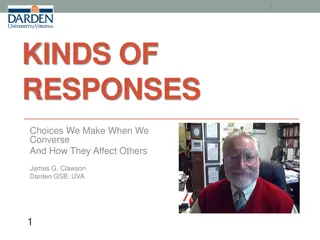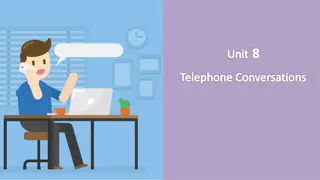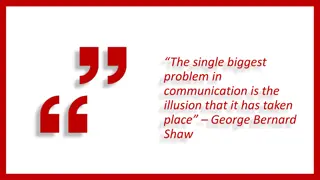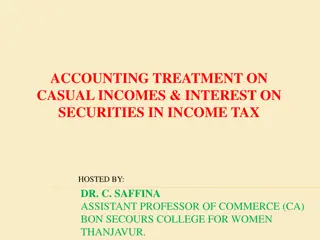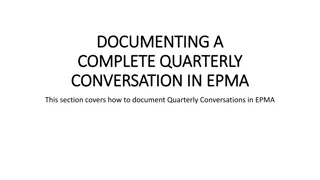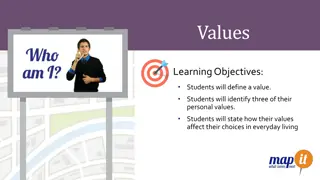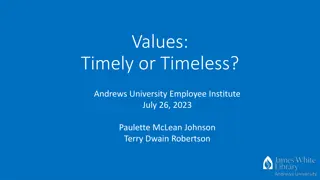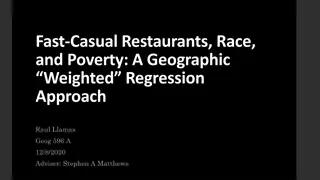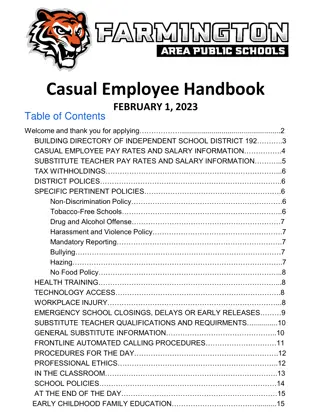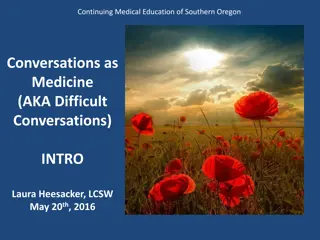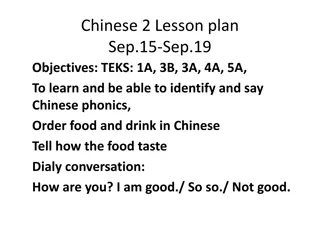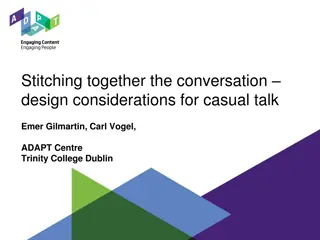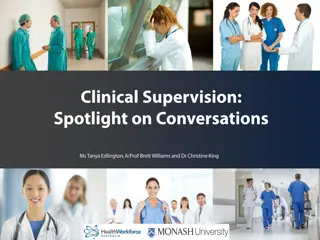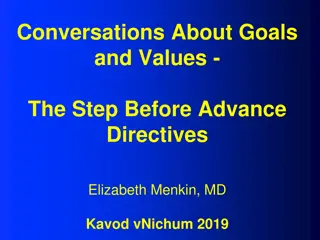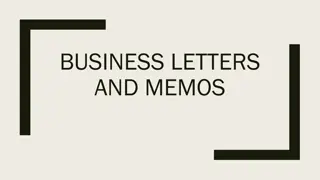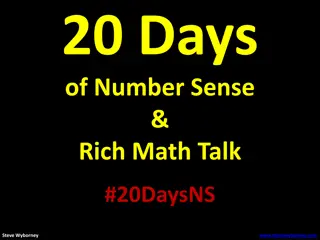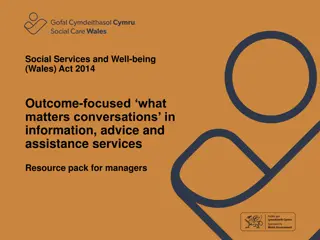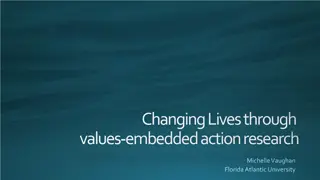Exploring Professional Values through Casual Conversations
Gain insights into the core values driving your profession through casual discussions, emphasizing the importance of inclusivity, accessibility, and diversity. Experts share their experiences on creating welcoming spaces and increasing access for all. Reflect on the challenges and opportunities in fostering a more diverse and open work environment.
Download Presentation

Please find below an Image/Link to download the presentation.
The content on the website is provided AS IS for your information and personal use only. It may not be sold, licensed, or shared on other websites without obtaining consent from the author. Download presentation by click this link. If you encounter any issues during the download, it is possible that the publisher has removed the file from their server.
E N D
Presentation Transcript
Office Talk Transformative talk Or, when casual conversations lead to renewed appreciation of the values that drive your profession
Today is gonna be the day: Get into groups of 5 or 6. Select a writer . Use markers and paper paper to jot down ideas from discussion. Listen to a short presentation a topic (1-2 minutes), then discuss with your group! (5 minutes)
We need to ensure space is comfortable and welcoming and usable for all members. This goes for collections too; there should be a wide variety of accessible materials. Finally, digital access, the library exists to bridge the digital divide and provide online access to all. --Laura Warner, Director Corporate Services & Facilities, Saskatoon Public Library
I believe that I remain limited in my capacity to fully engage with these values, to the degree that I continue to be surprised by my blind spots, though they seem to be fewer and fewer as time goes on. Many access issues are hidden. People won't often come up to you and tell you that they cannot access something. You have to be proactive and research possible issues, think strategically about what you can do to resolve or alleviate those barriers, and then let people know that the option they need is available. Letting people know is the hardest part. --Jeff Morton, Program Officer, Canada Council for the Arts 2012 - 2017 --Barb Longair, Manager of Children s Services and Public Services, Lethbridge Public Library
I have become disheartened over the years. I had a previous job in which we were advocating for Open Access, and talking about access constantly. I feel like this road is so slow. Access for me means that I work to increase diversity both in terms of a representative workforce and in the clients that a particular service reaches. The Saskatoon Public Library has recently been criticized for reducing the collection to meet accessibility standards developed by the City of London and used throughout municipalities in Canada. Access for me means that I work to increase diversity both in terms of a representative workforce and in the clients that a particular service reaches.
A culturally competent professional is one who is actively in the process of becoming aware of his or her own assumptions about human behavior, values, biases, preconceived notions, personal limitations, and so forth.
...people are at quite different levels of knowledge/familiarity with how these values are defined and why they are included. So from my experience I can say that clear leadership, language, and definitions at an institutional level make a critical difference. --Jeff Morton, Program Officer, Canada Council orf the Arts, 2012-2017
I think its always a struggle to navigate diversity issues within a institutional setting like a university. For example, I might try and incorporate scholars of colour into my syllabi but this work can seem lacking...if there are departments that are still comprised of all white faculty members! I am confident that I appreciate and nurture the diversity of our student populations through offering various viewpoints, including both local and global perspectives, in the materials and topics we cover.
I fear that the interest in Indigenous issues will fade over time, and that those of us that are here will be burnt out very quickly. How do you maintain an ongoing process of cultural competence in your job? What motivates or hinders you? How do you support diversity in your work? Libraries are having conversations around intellectual freedom versus diversity these days: the sharing of differing opinions versus hate speech. It is hard for libraries to figure out what to do in these situations when we value diverse opinions but also value inclusion of all people. --Gwen Schmidt, MLIS
The point of the library is social responsibility. We exist to ensure that everyone has an equal opportunity to access information. It means having information that reflects the needs of the community, reflects their culture, makes them comfortable, and also gives them a chance to push out of their comfort zone. It means hosting programs like all candidates debates, low income tax clinics, infant hearing screening, and more. It means offering battery and textile recycling and teaching people how to divert waste from the dump and why it's important. It means promoting tolerance for other people, having difficult conversations, providing staff with tools they need to deal with difficult situations, and so so so much more.
What Type of Socially Responsible are YOU? Take the quiz: http://etc.ch/G2yN
1. Should libraries give away condoms? 2. Is fiscal efficiency a social responsibility? 3. Should libraries have on site HIV testing? 4. Does the library have a social responsibility to build a more diverse workforce? 5. Should libraries function as after-hours shelters? 6. Should libraries do more to combat fake news ?
2. Two can Dine Libraries have a certain amount of responsibility, you agree. But more is not necessarily more valuable. 3. Rightly Moderate All things considered, you feel that libraries have to have appropriate boundaries for legal, personal, ethical, technological and staff-based concerns. 1. The Solo Partier You don t really think libraries have a place in society. You mostly want to keep all the books to yourself, preferably in the bath, and with a good beer. 4. Moderate lefty You find yourself wondering: Where did you come from? Where did you go? Where did you come from, cotton-eyed library? 5. Social. Justice. Library. Worker. Clearly you think libraries are on the cusp of the revolution, and you are off to the battlefront. 6. Wildly Responsible Daaaang girl, you ARE THE REVOLUTION. There are stars in your eyes, and world domination is in your hair.
Do you feel a responsibility to pursue justice for your community through your work? What does social responsibility mean to your community? What responsibilities does the library have simply as a public space? How does social responsibility intersect with access? intellectual freedom? With professionalism? With diversity? With service
Personally, I also value professionalism in that I believe that people should not be overly emotional at work and they should act in a way that the public would expect. To me, this means treating everyone politely and with respect whether they are the CEO or a really angry person yelling at you..., being on time, completing work in a timely fashion, looking presentable/dressing appropriately, etc.
It's so easy to find yourself in an awkward position or a serious gaff when too casual with patrons. Friendly but professional saves a lot of trouble. This is less of a thing. The campus and libraries are pretty casual - but professionalism as related to ethics and respects for others (sexual harassment, etc), comes up.
Conversation Connections: What are the library-as-institution s professional expectations? (how does the library lead professional development; how does the library lead in developing values?) What professionalisms (skills, behaviours, knowledge) are fundamental for your work? Where statutory and organizational forms have been seen to impoverish the quality of work, and increase the bureaucracy, professionalism can be defended as a uniquely desirable method of regulating, monitoring and providing complex services to the public. How does this relate to your work in libraries?
It is important to me to feel that I am helping people
We looked at every single customer facing policy to ensure that it made sense, put the customer first, and was worded positively. We included ALL staff in reworking policies and procedures and have a yearly customer service intensive training that all staff must take within the first year that they begin working with us --Barb Longair, Manager of Children s and Public Services, Lethbridge Public Library We have been encouraged to rove more and get out from behind the desk which allows us to provide better service VS
Access and service are our biggest stumbling blocks in supporting our students. They are often unaware of, given incorrect or contradictory information about, or unsure how to access services that promote their education, careers and personal autonomy. In academia service refers to practices such as sitting on committees, reviewing papers, participating on editorial boards, etc. I have seen some of our less fortunate clientele struggling to complete resumes or look for housing or fill out govt forms..but we spend our time helping people download overdrive on their devices --Jane McRobb
What,Finally, is the practical application of all this? Knowing where others stand on work values allows you to make strategic, strong and efficient partnerships.



